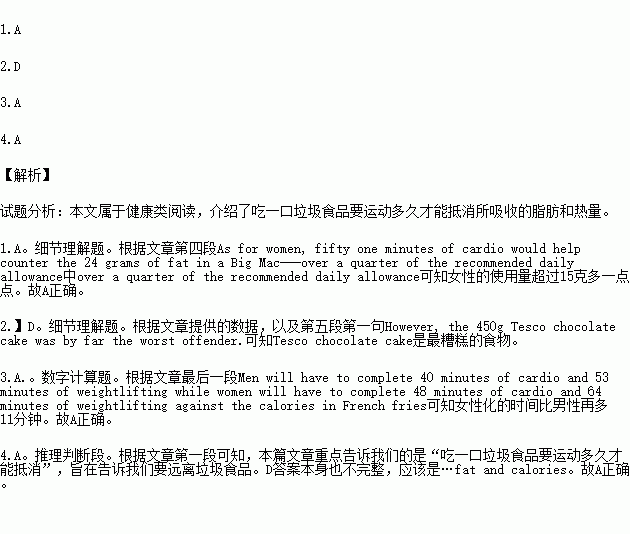题目内容
A new graph has revealed exactly how long you’11 need to sweat it out in the gym to neutralize (抵消) swallowing a favorite fast food.
While eating fried chicken, pizza and burgers will all entail a gym session of over an hour doing cardio(有氧运动)or lifting weights, women have it far harder than men and must work extra hard to banish calorie-packed meals.
After a classic McDonald's favorite, the Big Mac, men would need to do 42 minutes of cardio or 57 minutes of weightlifting.
As for women, fifty one minutes of cardio would help counter the 24 grams of fat in a Big Mac---over a quarter of the recommended daily allowance - --or an hour and eight minutes of weightlifting.
However, the 450g Tesco chocolate cake was by far the worst offender. Clocking in at a whopping 1,710 calories and 90 grams of fat, only a hardcore gym session is going to shift the calories you’ve absorbed from this dessert. The average woman would have to lift weights for almost four hours to work off the calories in this cake.
Comparatively a chocolate bar seems healthy, with 237 calories which would take 25 minutes for the average woman to run off. Alternatively you could spend thirty three minutes doing weightlifting exercises.
Men will have to complete 40 minutes of cardio and 53 minutes of weightlifting while women will have to complete 48 minutes of cardio and 64 minutes of weightlifting against the calories in French fries.
1.The fat of the recommended daily allowance for women is _________grams.
A .18 B. 20 C. 24 D. 30
2.According to the passage, __________is the unhealthiest food.
A. French fries B. the Big Mac
C. a chocolate bar D. Tesco chocolate cake
3.Compared with men, women must spend ________to consume the calories in French fries.
A. 11 more minutes lifting weights
B. 8 less minutes doing cardio
C. 8 more minutes lifting weights
D. 11 less minutes doing cardio
4.The main purpose of the passage is to___________.
A. inform us to stay away from fast food
B. offer us advice on how to keep healthy
C. tell us some information about fast food
D.suggest what we do to work off the calories
 阅读快车系列答案
阅读快车系列答案
